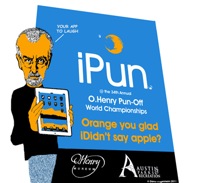Difference between revisions of "Pun"
(Created page with 'File:lighterstill.jpgright|frame ==Origin== perhaps from Italian puntiglio fine point, quibble *[http://en.wikipedia.org/wiki/17th_century 1662] ==...') |
m (Text replacement - "http://" to "https://") |
||
| Line 3: | Line 3: | ||
==Origin== | ==Origin== | ||
perhaps from Italian puntiglio fine point, [[quibble]] | perhaps from Italian puntiglio fine point, [[quibble]] | ||
| − | *[ | + | *[https://en.wikipedia.org/wiki/17th_century 1662] |
==Definition== | ==Definition== | ||
*1: the usually [[humorous]] use of a [[word]] in such a way as to suggest [[two]] or more of its [[meanings]] or the meaning of another word [[similar]] in [[sound]] | *1: the usually [[humorous]] use of a [[word]] in such a way as to suggest [[two]] or more of its [[meanings]] or the meaning of another word [[similar]] in [[sound]] | ||
==Description== | ==Description== | ||
| − | The '''pun''', also called ''paronomasia'', is a [[form]] of [[word]] [[play]] which suggests two or more [[meanings]], by exploiting multiple meanings of words, or of similar-sounding words, for an intended [[humorous]] or [[rhetorical]] [[effect]]. These [[ambiguities]] can arise from the [[intentional]] use and abuse of [ | + | The '''pun''', also called ''paronomasia'', is a [[form]] of [[word]] [[play]] which suggests two or more [[meanings]], by exploiting multiple meanings of words, or of similar-sounding words, for an intended [[humorous]] or [[rhetorical]] [[effect]]. These [[ambiguities]] can arise from the [[intentional]] use and abuse of [https://en.wikipedia.org/wiki/Homophone homophonic], [https://en.wikipedia.org/wiki/Homograph homographic], [https://en.wikipedia.org/wiki/Metonymy metonymic], or [[metaphorical]] [[language]]. A pun differs from a [[malapropism]] in that a malapropism uses an incorrect [[expression]] that alludes to another (usually correct) expression, but a pun uses a correct expression that alludes to another (sometimes correct but more often absurdly humorous) [[expression]]. [https://en.wikipedia.org/wiki/Henri_Bergson Henri Bergson] defined a pun as a sentence or utterance in which "two different sets of [[ideas]] are [[expressed]], and we are confronted with only one series of words". Puns may be regarded as in-jokes or [[Idiom|idiomatic]] constructions, given that their usage and [[meaning]] are entirely local to a particular language and its [[culture]]. For example, camping is [[intense]] (in tents). |
| − | Puns are used to create [[humor]] and sometimes require a large vocabulary to [[understand]]. Puns have long been used by comedy [[writers]], such as [ | + | Puns are used to create [[humor]] and sometimes require a large vocabulary to [[understand]]. Puns have long been used by comedy [[writers]], such as [https://en.wikipedia.org/wiki/William_Shakespeare William Shakespeare], [https://en.wikipedia.org/wiki/Oscar_Wilde Oscar Wilde], and [https://en.wikipedia.org/wiki/George_Carlin George Carlin]. The Roman playwright [https://en.wikipedia.org/wiki/Plautus Plautus] is [[famous]] for his tendency to make up and change the [[meaning]] of [[words]] to create puns in [[Latin]]. |
[[Category: Languages and Literature]] | [[Category: Languages and Literature]] | ||
Latest revision as of 02:35, 13 December 2020
Origin
perhaps from Italian puntiglio fine point, quibble
Definition
- 1: the usually humorous use of a word in such a way as to suggest two or more of its meanings or the meaning of another word similar in sound
Description
The pun, also called paronomasia, is a form of word play which suggests two or more meanings, by exploiting multiple meanings of words, or of similar-sounding words, for an intended humorous or rhetorical effect. These ambiguities can arise from the intentional use and abuse of homophonic, homographic, metonymic, or metaphorical language. A pun differs from a malapropism in that a malapropism uses an incorrect expression that alludes to another (usually correct) expression, but a pun uses a correct expression that alludes to another (sometimes correct but more often absurdly humorous) expression. Henri Bergson defined a pun as a sentence or utterance in which "two different sets of ideas are expressed, and we are confronted with only one series of words". Puns may be regarded as in-jokes or idiomatic constructions, given that their usage and meaning are entirely local to a particular language and its culture. For example, camping is intense (in tents).
Puns are used to create humor and sometimes require a large vocabulary to understand. Puns have long been used by comedy writers, such as William Shakespeare, Oscar Wilde, and George Carlin. The Roman playwright Plautus is famous for his tendency to make up and change the meaning of words to create puns in Latin.
